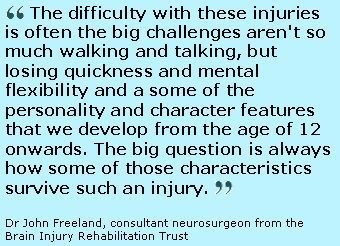Hamster's Progress
 I don't want to be a pessimist, but I have seen first hand the effects of head injuries and Richard Hammond has a long way to go. His reovery has been amazing, but at long as he survived, this bit was almost the easy bit. The road to recovery will be much slower and more frustrating now & he is at risk of personality changes. I wish him luck, the brain is an amazing organ & we don't really understand how it works fully yet. This from the BBC:
I don't want to be a pessimist, but I have seen first hand the effects of head injuries and Richard Hammond has a long way to go. His reovery has been amazing, but at long as he survived, this bit was almost the easy bit. The road to recovery will be much slower and more frustrating now & he is at risk of personality changes. I wish him luck, the brain is an amazing organ & we don't really understand how it works fully yet. This from the BBC:The rapid recovery of Top Gear presenter Richard Hammond after his high-speed car crash has amazed the public and medical experts. Only nine days after his 300mph jet-powered car crashed during filming, Mr Hammond is walking and talking and off emergency care. But his progress over the next six months is likely to be much slower and the outcomes less clear, say doctors.
Neurosurgeon Stuart Ross, who looked after Mr Hammond at Leeds General Infirmary in the days following his accident, said rest could help Mr Hammond recover from his "brain injury" within months. But he said: "There comes a period now which is unfortunately slow and is difficult to get through."

Dr John Freeland, consultant neurosurgeon from the Brain Injury Rehabilitation Trust, said it was too early too tell what the long-term future would hold. The nature of Mr Hammond's brain injuries thankfully mean that functions such as speech, movement and breathing were unaffected, said Dr Freeland. The frontal lobe is critical for more subtle functions, like personality and ability to make judgements.
Dr Freeland said he had seen patients with similar brain injuries recover from comas with very little lasting damage. But he said he had seen others with lasting changes. He said the focus of Mr Hammond's treatment over the next six months would be rehabilitation - making sure his balance is back and he is able to do learned everyday activities that people tend to take for granted, such as doing up buttons.
He said doctors would also be monitoring Mr Hammonds cognitive and emotional state. "Character and personality changes are fairly pervasive with motor vehicle accidents," he said, but added that the brain was changeable or "plastic" and repaired itself over time to varying extents.
 "Much of the wiring of the frontal lobes occurs in puberty. Some of the hardware systems are maturing through to our 20s. The software - developing our self-awareness and how to fit into the social fabric - is very gradual, over decades. "Recovery from these injuries does continue, but it takes time," he said.
"Much of the wiring of the frontal lobes occurs in puberty. Some of the hardware systems are maturing through to our 20s. The software - developing our self-awareness and how to fit into the social fabric - is very gradual, over decades. "Recovery from these injuries does continue, but it takes time," he said.


1 Comments:
I agree. And I don't think it's pessimism at all. I've seen children recover from accidents like this. But never adults. Never fully. Maybe it's because it's difficult for them to accept that they will never be exactly like they were before. I dunno. But it still takes my breath away and makes me faint when I think '300 miles!'.
Post a Comment
<< Home